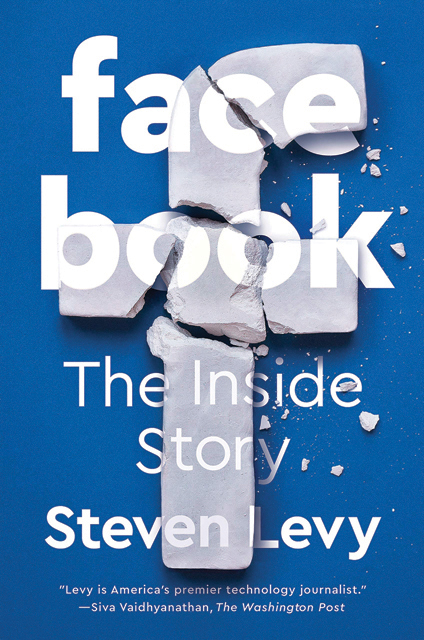City Pages: Behind the scenes at Facebook, the secret lives of extremists and a Silicon Valley memoir

Facebook: The Inside Story by Steven Levy
Review by Emily Nicolle

In the past four years, Facebook founder Mark Zuckerberg’s world has been turned upside down. From a simple social media platform he created while studying at Harvard university first blossomed a networking supersite, that later became a regulatory and ethical data minefield which holds a terrifying amount of power over the way we communicate and form decisions.
At the centre of this, Zuckerberg maintains a significant amount of influence that has most certainly dictated Facebook’s trajectory — owning around 60 per cent of the company’s voting shares, despite having raised billions of dollars in private and public investment.
Steven Levy’s Facebook: The Inside Story aims to chart one man’s rise from a coder with a voracious appetite for challenging computer projects to the head of a global empire. Levy, having previously written one of the most definitive books on Google, was given unprecedented levels of access to Zuckerberg and senior company executives over three years to achieve this goal.
We follow Zuckerberg and the team as he almost gets expelled from Harvard for stripping its servers for college student data to create Facebook’s earlier brother, Facemash. Later, we see a more human side to Zuckerberg as he gets upset at having to turn down a favoured investor.
But the narrative that runs through the entire work is one of a tech founder’s lust for control, having fallen in love with strategic computer games such as Civilisation as a teenager and developed an awe of the (questionable) empire tactics of Roman leader Augustus.
The young entrepreneur regularly shouted out “Domination!” at the end of company meetings at Facebook, as the company absorbed smaller rivals such as Instagram and ignored the warning signs of misusing the personal data of billions.
Facebook: The Inside Story provides unparalleled insight into one of the world’s most prominent tech companies, and is required reading for anyone seeking to understand Facebook or its infamous founder.
But the access given to Levy in the writing of this book has ultimately forged a saccharine view of Facebook’s transformation into a company for which scandals have become the norm. Attempts to remind the reader of the consequences of Facebook’s power are briefly passed over, in favour of depicting Zuckerberg as a teenager with good intentions who was awarded too much power at an early age.
Be careful not to come away from Levy’s writing with a sense of pity for the man for whom it all seemingly accidentally happened to, rather than tech’s next calculating megamind.
Uncanny Valley by Anna Wiener
Review by Poppy Wood

As a disillusioned twenty-something, Anna Wiener abandoned her publishing job in New York and swapped her silk blouses for hoodies and high-tops as she headed for the rapidly mobilising oasis of Silicon Valley.
With little experience of tech culture beyond hours of endless scrolling on “the social media network that everyone hated”, Wiener managed to land jobs at a string of startups and gently wing her way into a world of coding and customer support. The result is a wry and intelligent reality check for startup culture written from the perspective of a rank outsider.
As much a critique of millennial consumerism as the tech world, Uncanny Valley paints the San Francisco startup scene as the male version of green smoothies and yoga. Both swear by self-help books; both dabble in veganism — but both are not treated equally.
With a fine balance of humour and sincerity, Wiener prises open a world where sexism is rife, “like wallpaper, like air”. Though this is mainly handled with the same casualness with which it is dished out, at some points her anecdotes of workplace sexism hit some rather alarming decibels — this is a world where women are discouraged from asking for a raise and encouraged to “trust karma”; where CEOs create lists of the “most bangable women in the office”; and where one woman is “raped by an engineer and then pushed out of the company when reporting it to HR”.
The book is consistently sharp and incisive, and scattered with thinly-veiled allusions to the brightest stars on the tech walk of fame. At one point, Wiener splurges her whopping new salary by attending hypnotherapy to stop her from biting her nails, “during which I accidentally fell asleep and had an unerotic dream about the founder of the social media network everyone hated”.
But Uncanny Valley is also a fable for the digital age. Wiener nonchalantly dismantles the jargon of Siliconese, as if trialling a new Dualingo feature — but in doing so undergoes the slow dawning that her many perky office jobs filled with pool tables and trailer mix might have been up to slightly more sinister things. “My throat felt like acid”, she says, as the shadow of Edward Snowden seeps into the cracks of each chapter and she slowly realises what a “data collection” startup might entail.
As a result, Wiener is forced to tackle the big bad wolf of surveillance — “one of the moral quandaries of our time” — and reveals how the perceived monolith actually boils down to a bunch of software firms run by 25-year-old tech bros who genuinely believe they are splitting the atom.
Though well-written and brilliantly sardonic, Wiener’s experience ultimately serves as an interrogation of a world teetering on the edge of illegality — a world whose uncanny consequences we are only just starting to feel.
Going Dark: The Secret Social Lives of Extremists by Julia Ebner
Review by Jess Clark

Most of Going Dark: The Secret Social Lives of Extremists plays out online.
Assuming a variety of identities, Julia Ebner reports from the frontline of far right messageboards, jihadi forums and anti-feminist communities, in a thorough and shocking exploration of how the internet has facilitated the spread of extremism.
However, the book is the most unsettling when Ebner shows the physical manifestation of online extremism. Ebner, who by day is a senior research fellow at the Institute for Strategic Dialogue, visits a neo Nazi music festival and goes undercover at a far right meeting in a London pub.
If those events are unsettling, then more harrowing is when Ebner’s research demonstrates how online extremism can transform into real world violence that readers will recognise from recent news headlines. Ebner depicts the vast and rapid spread of online extremism, and the challenge we face in fighting it.